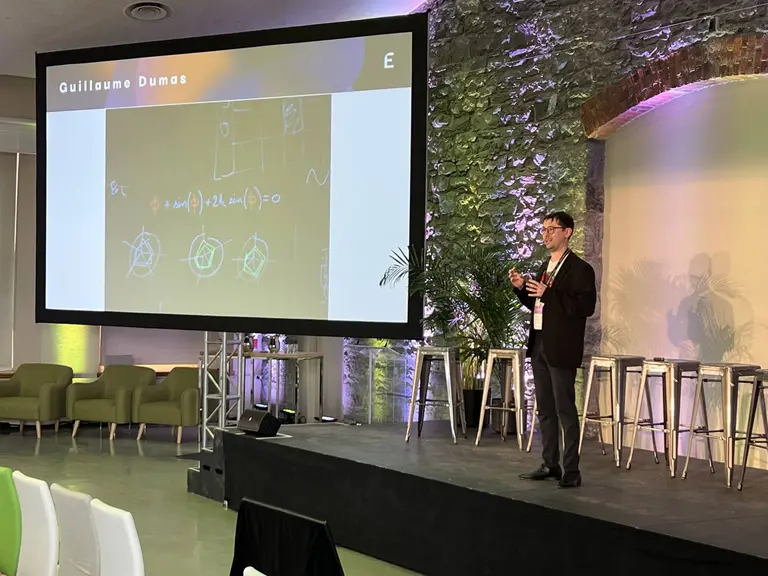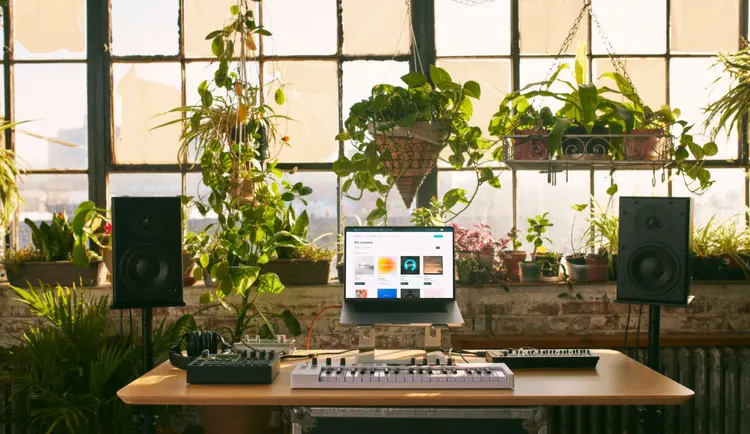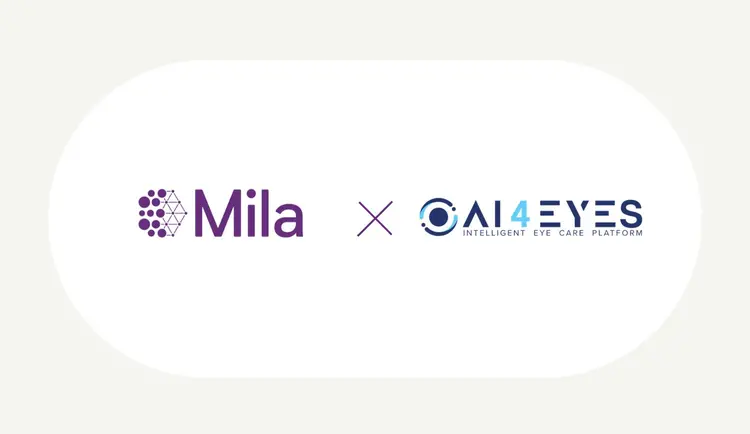
Mila researcher Guillaume Dumas received an EFFERVESCENCE Stars award in early May 2023 for his research work, including the mixed-reality video game Pop'Balloons aimed at diagnosing and promoting the inclusion of people with autism through artificial intelligence (AI). The competition recognizes three Quebec researchers for their scientific contributions and for their collaboration with the life sciences and health technology industry.
"This award is a great recognition of the long and tumultuous path taken between basic, translational and applied research. This project started with observations in the lab and equations on a board, then continued in a hospital setting in interaction with caregivers and patients, and finally led to the design of a solution with digital and video game professionals," explains Guillaume Dumas.
In Pop'Balloons, children have to pop balloons with their fingers according to an increasing level of difficulty through mixed reality glasses that do not totally isolate them from their immediate environment. This allows to measure the child's reaction time and motor skills, but also her or his social and learning abilities thanks to a 3D avatar that adapts its behavior to that of the child.
The game gives researchers the opportunity to collect data to analyze the child's perseverance and ability to detect social cues with AI to help diagnose a potential neuropsychological disorder.
Synchronizing brains
Now an Associate Professor of computational psychiatry at the University of Montreal, Guillaume Dumas describes his career path as having been "a bit chaotic, but in a good way."
After his engineering degree, he became interested in astrophysics, fundamental physics, genetics, then cognitive and social neurosciences before specializing in neuropsychiatry and AI.
"I have always been guided by fundamental questions related to the understanding of human cognition, especially its social dimension," more recently in health and its disorders, he explains.
His work has shown that human brains synchronize during interactions with other people, which affects the development of social cognition. His research also shows that human intelligence cannot be studied without this social dimension, and this has consequences for the AI field. In that sense, he recently co-published a scientific paper titled "Social Neuro AI: Social Interaction as the 'Dark Matter' of AI."
"With Mila, it was a good fit when I arrived two years ago because it created a loop, a virtuous circle: I can both use machine learning for cognitive neuroscience and medicine, and in turn, use those results to help design new generations of AI algorithms."
In doing so, he contributes to the research of the Mila community dedicated to studying the intersections between neuroscience and AI (NeuroAI), which includes Mila founder and scientific director Yoshua Bengio and Mila researchers Guillaume Lajoie and Blake Richards.
Clinical trial
Pop'Balloons is the result of a long-term project that began in a laboratory in the United States and continued in a hospital in France.
"Autistic children, who are quite direct, made me understand that my avatar was crappy and that my video game was ugly," he recalls, amused.
"In a way, those autistic kids were the best advisors."
Over time, the project was refined to the current version, finalized in partnership with the video game industry.
His research laboratory is now located at the CHU Sainte-Justine, where the ethics committee has just validated a preclinical trial to verify the accessibility and effectiveness of the serious video game.
"The trial that we are currently doing at Sainte-Justine aims to validate the fact that we can make a good classification for diagnosis, but also to look at how well we can predict clinical measures from validated neuropsychological tests in relation to clinical standards.”
Once these diagnostic aspects have been validated, the idea is to continue the development of the project from evaluation to intervention: the video game can be adapted to the player in order to accompany her or him in learning or rehabilitation.
"The world of video games shares common ground with developmental psychology. Developers seek to put the player in a state of "flow", this zone of balance where the difficulty is neither too low and boring nor too high and discouraging. Psychologists talk about the zone of proximal development for behaviors that a child can do but has not yet explored," Guillaume Dumas explains.
Reproducibility of results and accessibility
The use of a widely accessible mixed reality headset (HoloLens) also allows a good reproducibility of the experiment in any context, and can simplify the follow-up of patients.
For instance, this would allow early detection in isolated locations such as Northern Quebec, where access to specialized health care is more difficult.
"From a healthcare system point of view, it can be a very interesting tool in the current context where there are huge waiting times to access a neuropsychologist and to do tests.”
Guillaume Dumas says the same type of project could also be applied to other cases in neuropsychiatry and mental health.
"We are working on autism but this approach can be applied to many other conditions, it is a much broader concept," he concludes.





